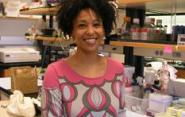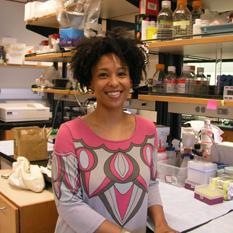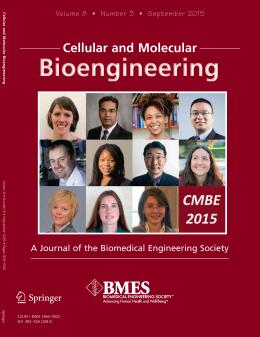Anjelica Gonzalez Named a Cellular and Molecular Bioengineering Young Innovator of 2015

Pericytes were once an overlooked cell, thought to be little more than structural support for small blood vessels. But Anjelica Gonzalez, the Donna L. Dubinsky Associate Professor of Biomedical Engineering, is showing that they may well play a major role inflammation.
That idea has earned Gonzalez recognition as a Young Innovator of 2015 by the journal Cellular and Molecular Bioengineering.
 Gonzalez's lab has focused on the development of biomaterials for use as investigational tools, particularly for the investigation of immunological responses to inflammatory signals from endogenous and exogenous sources. One of her ongoing projects is creating models of the human extracellular matrix that look and perform as those created by pericytes. It was a paper related to this work that prompted CMBE to name her a Young Innovator. In the September issue of CMBE, the editors write of Gonzalez's research:
Gonzalez's lab has focused on the development of biomaterials for use as investigational tools, particularly for the investigation of immunological responses to inflammatory signals from endogenous and exogenous sources. One of her ongoing projects is creating models of the human extracellular matrix that look and perform as those created by pericytes. It was a paper related to this work that prompted CMBE to name her a Young Innovator. In the September issue of CMBE, the editors write of Gonzalez's research:
"Anjelica Gonzalez's group at Yale University describes the use of liquid chromatography/tandem mass spectrometry to analyze the extracellular matrix deposited by pericytes, showing distinct differences between its composition and the ECM deposited by smooth muscle cells."
Gonzalez said she got the idea for the research because inflammation models would always end "where the leukocyte meets the endothelial cell."
"But, there's more to the blood vessel than just the endothelial cell; there are also pericytes, and all of their products," she says. "So, I thought...let's complete the model. Let's make a whole, human, microvessel in the lab, incusive of the pericyte and it's deposited matrix. This will allow us to more completely understand all of the processes that dictate inflammation.
Up next, she says, is using the pericyte-derived matrix as the basis for a tissue engineered vascular graft, or using it in experimental models of vascular growth and disease.
It's the second year that the journal has named Young Innovators. The competition is open to all tenure-track assistant professors working in the field of Cellular and Molecular Bioengineering. The 11 researchers this year were selected through a competitive process after applicants were asked to submit a biosketch and an abstract to be considered for the competition. Finalists were then invited to submit full-length manuscripts that underwent a rigorous peer-review process. This year's Young Innovators will present their research in Tampa in October.

